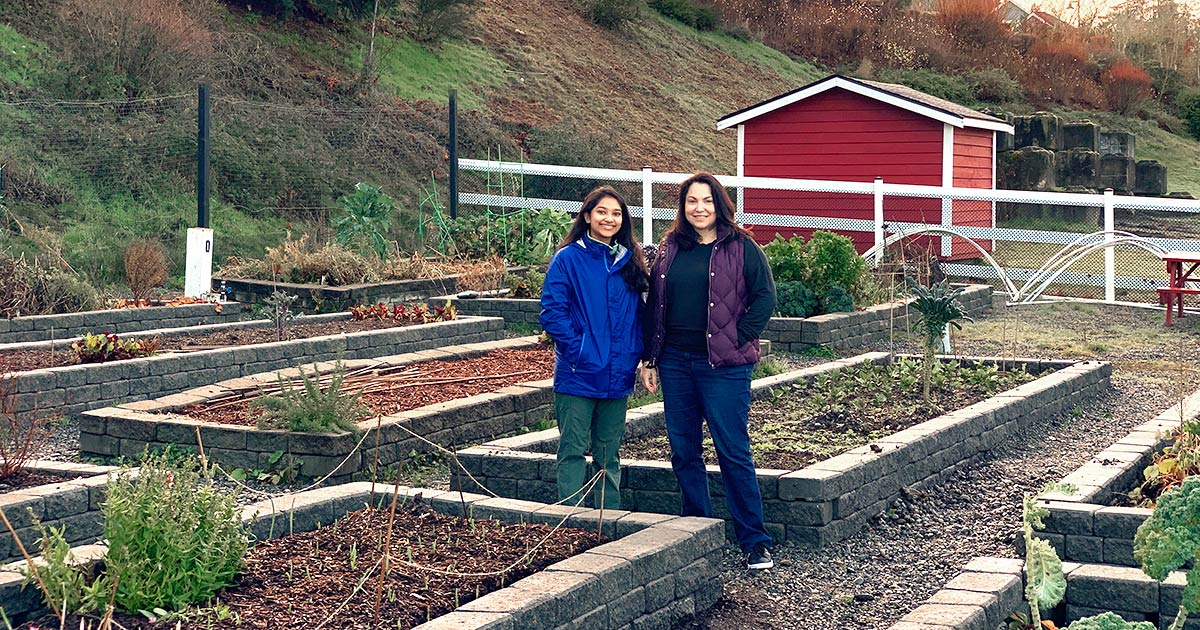
Throughout history, community gardens have lifted spirits and brought people together. Our Issaquah Highlands community gardens are no exception.
A light breeze sweeps through the air on a foggy November afternoon as Lindsey Pinkston crouches over a bare patch of dirt in the Issaquah Highlands Vista Community Gardens. Though not much grows this time of year, the Highlands Council community program manager still enjoys touring the gardens and observing gardeners who maintain their patches throughout the winter, keeping patches free of weeds, and planting cover crops to replenish the soil for a fruitful gardening season in 2022.
The gravel trail leading to and from the Vista Community Gardens teem with small children bundled in layers of puffy coats and knitted hats, grasping their parents’ hands while walking home from Grand Ridge Elementary School. The prospect of growing your own food, coupled with the youthful buzz of energy around the gardens, makes it easy to see why someone might spend all their time here.
The Vista Community Gardens are along a trail below Black Nugget Park near the Roanoke Woods neighborhood. Since 2013, just over 60 raised cedar garden plots, measuring 4 feet by 12 feet, have annually garnered far-reaching community support from enthusiastic gardeners, some of which are not even Issaquah Highlands residents. With a second location in the Sunset Walk neighborhood and soon a third in the new Westridge neighborhood, the Issaquah Highlands community gardens provide lighthearted fun, bring families together, and promote healthy eating habits, particularly during the challenging times of the COVID-19 pandemic.
Throughout American history, the purpose of community gardens has fluctuated based on societal needs. The concept of community gardens as we know them today dates to the 1890s, when the government focused on creating programs that cultivated vacant city lots and assigned plots to families to grow storable produce, such as beans and carrots.
Fast forward to the Great Depression, where relief gardens mitigated hunger and food insecurity in addition to serving as a pastime to combat the unprecedented rates of unemployment. Along the same lines, World War I and World War II, which emphasized patriotic volunteerism and relief work during a time of heavy rationing, brought about liberty and victory gardens.
Though we haven’t faced the same level of food scarcity or need for rationing during the COVID-19 pandemic as in decades past, the need to garden as an escape from boredom and grim realities remains in our blood.
“When COVID first hit, interest in the gardens spiked by a lot,” Lindsey, who helps manage the Issaquah Highlands community gardens, said. “There were shortages in the grocery store, and people didn’t have anything to do, [so] I think gardening became something a lot of people wanted to try, and we sold out right away that year.”
Although some people gave up their patches midway through 2020 after realizing gardening entails more than watering plants and praying you have a green thumb, the gardens remain busy even in the second year of the pandemic.
The Vista Community Gardens also foster a sense of community each passing year. According to Lindsey, neighbors are quick to share their successful harvests.
“You’ll often see a post on our [community garden] Facebook group that says something like, ‘I had a really great tomato crop this week – anyone want tomatoes? I can drop them off!’ [The community gardeners] enjoy sharing with each other,” Lindsey said.
It seems community service is just as much a part of the gardens as learning how to care for crops. Local Girl Scouts created a program called “Grow a Row,” which encourages people to grow an extra row of food so the Girl Scouts can harvest that row and donate the produce to the Issaquah Food and Clothing Bank.
The Issaquah Highlands Vista Community Gardens demonstrate how community gardens fulfill a larger purpose than simply providing fresh produce; they also encourage compassion for neighbors, promote sustainability, and create a much-needed sense of “normal.”
Interested in having your own community garden patch in 2022?
Visit issaquahhighlands.com/community-garden to learn more and request a patch.
Anika Mehta is a 12th-grader, member of the Highlands Youth Advisory Board, and Issaquah Highlands resident. As published in Winter 2022 Connections.





